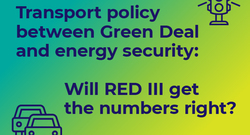Transport policy between Green Deal and energy security: Will RED III get the numbers right?
Recording of our online event on 22 March 2022 about European transport policy between Green Deal and energy security.
The Russian invasion into Ukraine adds yet another major challenge to the European energy policy landscape. While the ‘Fit for 55’ legislative package including the RED III seeks to urgently transform Europe towards sustainable and carbon-free energy, the war just outside EU borders grimly highlights our vulnerability to geopolitical conflicts.
In the transport sector, renewable fuels and electricity shall decrease the carbon footprint by at least 13% in each EU member state by 2030. However, the numbers in current RED III proposals were already raising questions whether our decarbonization path will live up to the urgency of the transformation ahead. Given the situation currently unfolding, the transformation becomes ever more urgent yet complex.
So how does the war affect our models and assumptions regarding green transport? How does it affect the RED III negotiations in terms of targets, priorities and instruments? What are the options at hand to decrease our energy dependency on Russia and decarbonize the transport sector at the same time? Does climate need to take a step back, or shall we even unlock further renewable potential to pursue more ambitious targets?
With keynotes from:
- Carlo Hamelinck (Studio GearUp)
- Uta Pfeiffer (BDI)
And a panel discussion with:
- Bernd Kuepker (European Commission)
- Dr. Peter Jahr (European Parliament)
- Carlos Calvo Ambel (Transport & Environment)
- Stefan Schreiber (VDB)
Moderated by Sonja van Renssen (Energy Monitor)
The event was carried out in cooperation with the Association of the German Biofuel Industry (VDB) and OVID Association of the Oilseed Crushing and Oil Refining Industry in Germany.
In the transport sector, renewable fuels and electricity shall decrease the carbon footprint by at least 13% in each EU member state by 2030. However, the numbers in current RED III proposals were already raising questions whether our decarbonization path will live up to the urgency of the transformation ahead. Given the situation currently unfolding, the transformation becomes ever more urgent yet complex.
So how does the war affect our models and assumptions regarding green transport? How does it affect the RED III negotiations in terms of targets, priorities and instruments? What are the options at hand to decrease our energy dependency on Russia and decarbonize the transport sector at the same time? Does climate need to take a step back, or shall we even unlock further renewable potential to pursue more ambitious targets?
With keynotes from:
- Carlo Hamelinck (Studio GearUp)
- Uta Pfeiffer (BDI)
And a panel discussion with:
- Bernd Kuepker (European Commission)
- Dr. Peter Jahr (European Parliament)
- Carlos Calvo Ambel (Transport & Environment)
- Stefan Schreiber (VDB)
Moderated by Sonja van Renssen (Energy Monitor)
The event was carried out in cooperation with the Association of the German Biofuel Industry (VDB) and OVID Association of the Oilseed Crushing and Oil Refining Industry in Germany.


Social Media